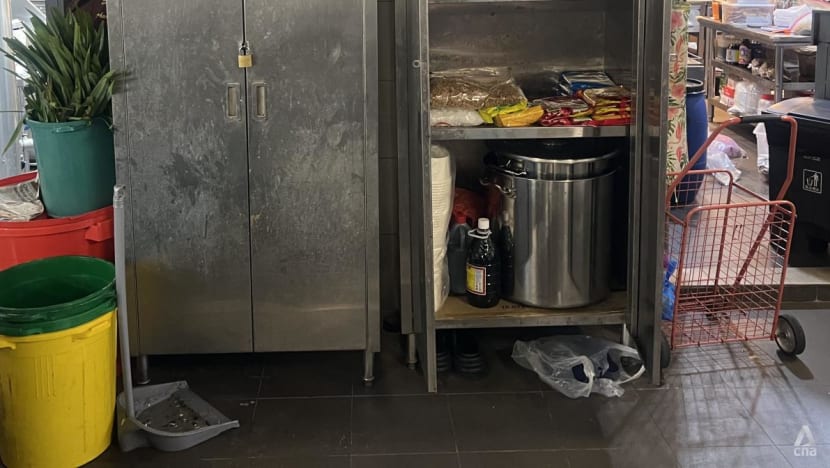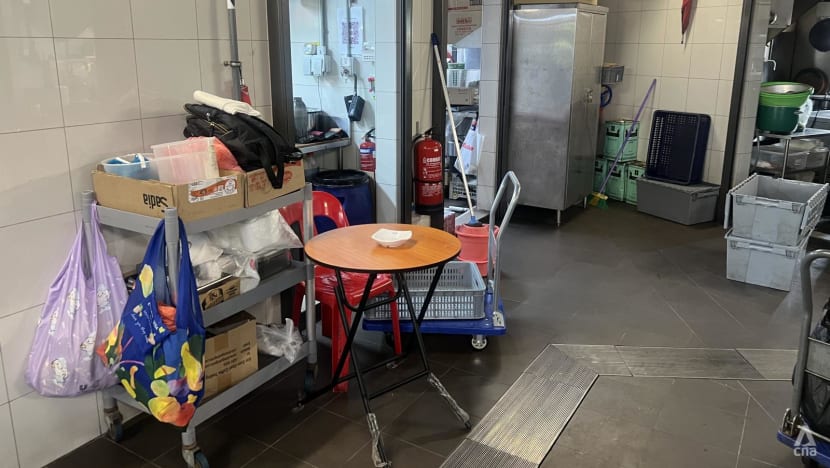Bukit Canberra hawkers charged for using extra space permanently, not for baskets: Operator
Hawkers will not be charged for temporarily leaving items in the space behind their stalls, said Canopy Hawkers Group’s managing director.

Cabinets at the back of the hawker stalls in Bukit Canberra Hawker Centre. Hawkers there have to pay an additional S$70 per month to leave these cabinets behind their stalls permanently. (Photo: CNA/Ang Hwee Min)

This audio is generated by an AI tool.
SINGAPORE: Bukit Canberra Hawker Centre charges hawkers for the space to put a cabinet or other permanent storage fixtures behind their stalls, not for the use of blue baskets, the hawker centre’s management said on Tuesday (Aug 12).
Speaking to CNA at the hawker centre on Tuesday afternoon, managing director of Canopy Hawkers Group Joey Tan said the group charges S$70 (US$55) before Goods and Services Tax (GST) to hawkers who want to leave cabinets or shelves permanently behind their stalls, which is called a temporary occupation licence.
Leaving items like baskets with overnight deliveries in those areas temporarily is not chargeable, he added.
The management initially received requests from hawkers who wanted to add permanent cabinets to those spaces for the rest of their lease, he told CNA.
After looking into the matter and applying for the necessary permits, they started charging tenants who wanted to place cabinets or shelves there.
“Last time we told them, even if your delivery comes, please put it properly because there are rats, there are pests. Food may be contaminated. So we did advise our tenants, if you want, maybe you can consider this,” Mr Tan said.
Food critic KF Seetoh claimed on Aug 4 that the hawkers were being charged S$70 a month to leave a basket at the back of their stores for suppliers to place their wares.
Member of Parliament for Sembawang GRC Ong Ye Kung clarified on Monday that there is "no practice of charging" for the use of the blue baskets at the back of their stalls.
Responding to Mr Ong's post, Mr Seetoh said later on Monday that the cost of using the baskets was "shown and told to me by a hawker there".
On Tuesday, Mr Seetoh posted another Facebook post with an invoice for the “blue box rental”. The invoice he uploaded indicates that the S$70 charge is for the rental of a space in the “backyard cluster”, with a “TOL”, which refers to the temporary occupation licence.
“Hawkers use it for their suppliers to place the orders before operation hours … If you use that space, whether for blue box supply deliveries or place a cabinet for storage (some sharper hawkers do that), it's chargeable and it's what was corresponded with the hawker (see chat image below),” he wrote in his post.
“They should just charge for storage cabinets, not for a blue box, be fair.”
CNA spoke to six hawkers who confirmed that they were aware that they had to rent the space for permanent items like cabinets, but not temporary ones like deliveries that arrive in baskets.
Mr Dennis Ow, who runs a vegetarian stall, said he paid for it because he needed the extra space, and it was cleaner and more convenient to store his supplies in a locked cabinet.
He bought his own cabinet for about S$1,000, he told CNA. At the start of his lease, he left his items in baskets behind the stall, and the National Environment Agency (NEA) said he could pay to use the space properly with a permanent cabinet.
“The space isn’t ours, it belongs to NEA. If you want to use it, of course you have to pay,” said the 65-year-old.
“It doesn’t matter that much to me, it’s S$70 a month … There are some people who can’t bear to spend the money, so those people will complain.”
Hawkers who do not rent the space behind their stalls said they often leave items there temporarily, but pack the items back into their stalls when necessary.
Ms Irene Pang, who runs the dough fritters stall, parks a trolley that carries her supplies alongside a table and chair in the space behind her stall.
After her work is done for the day, she wheels the trolley back into her stall to clear the space.
The 59-year-old hawker is aware of KF Seetoh’s claims that the hawker centre management charged them for the use of the blue baskets, and told CNA that those claims were not true.
“This is how it started last year. They said that since we serve food, if we leave things outside, the rats may come. How about you rent the space and use cabinets? They asked us and some of us agreed,” she said, stressing that the scheme was optional.
“I don’t rent the space because I don’t need to leave this here. I wheel all this back in every day. When you come here at night when they wash the floor at night, this whole area is clean and the other cabinets are locked,” said Ms Pang.
Before some tenants installed their cabinets, food and supplies would be left out in baskets on the floor, she added.
“We serve food, so hygiene is important. Putting everything in a cabinet and locking it up is much cleaner and safer.”

Ms Chen Liping, who runs the stall selling noodles, also opted not to rent the space. Since she can only leave items there temporarily, she instructs delivery drivers to leave food items in her stall instead.
“Other than that, I just put this chair here so I can rest in the afternoons, then I can fold it and keep it in my stall when I don’t need it,” she added.
FREE MEALS
In his latest post on Tuesday, Mr Seetoh reiterated that the hawkers are contractually obligated to offer 60 free, unsubsidised charity meals per month.
“It may not be enforced, but they are at the mercy and grace of the operators. It's not stated that no punishment (is) meted if they fail to do so,” he wrote.
Mr Ong had earlier replied to Mr Seetoh to confirm that stallholders at Bukit Canberra Hawker Centre would not be penalised for not providing free meals to low-income residents.
"There are no penalties if they do not or are unable to provide the meals," he said on Monday, adding that the initiative, which was meant to encourage hawkers to "pay it forward", has yet to commence.
When asked about the free meals that Mr Seetoh claimed were part of their contracts, the hawkers confirmed that these clauses were real.
Those CNA spoke to also highlighted that the free food scheme has not been implemented even though some of their three-year contracts were coming to an end. Canopy Hawkers Group’s Mr Tan also confirmed that the scheme has not started.
“If you’re here earning money from everyone every day, shouldn’t you give back to the community a bit? Two meals a day is manageable,” said Mr Ow, adding that he already gives free meals away to those who need them.
Hawkers were also aware of the clauses when they signed their leases, he stressed. “If you want to sign the contract, then you should follow it. Don’t sign the contract, then complain about it.”
Ms Pang agreed that many hawkers like herself are feeling the pinch from the rising prices of essentials and may worry about providing free meals.
Since the scheme has not been begun, hawkers who cannot afford to give away free meals do not need to do so, she added.
“But for me, if I can do it, I will just do it. If you can’t do it, I’m sure you can talk to the management and work something out,” she said, adding that she sometimes gives away free snacks to elderly, low-income customers.
The number of free meals has since been revised to 100 meals over their three-year contract, hawkers said. Mr Ong also clarified this point on Monday.
While she was unaware of the previous terms of 60 meals every two months, Ms Chen said that since last year, the scheme has involved providing 100 free meals over her three-year lease.
“Everyone here who signed the contract would know about it. When they signed it, they would have asked all their questions,” she added.
“If they choose you to run the stall and offer their terms, you only sign the contract if you accept the terms … It’s not like halfway through your contract, your business is not good, then you suddenly complain about the terms.”
The 53-year-old hawker considered 100 meals over three years a reasonable number, which is why she accepted the terms. “Whether business is good or bad, it’s our own problem.”
When asked if he had a response to hawkers who said they considered the free meal terms in their contract reasonable, Mr Seetoh reiterated to CNA: “Charity meals, if voluntary, should not be in the contract.”
He also said another tenant would dispute the operator’s statement that they do not have to pay to place baskets in the space, but declined to identify the individual.















